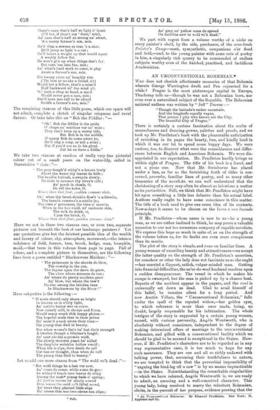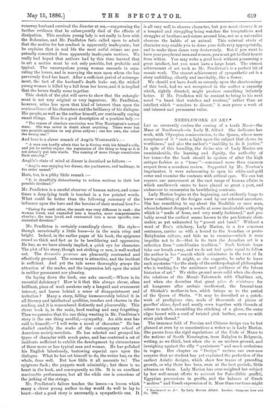AN UNCONVENTIONAL BOHEMIAN.* Wno does not cherish affectionate memories of
that Bohemia wherein George Warrington dwelt and Pen sojourned for a while ? Prague is the most picturesque capital in Europe, Thackeray tells us—though he was not a Bohemian born, nor even ever a naturalised subject of the Republic. The Bohemian national anthem was written by " Jeff " Prowse :- " Though the latitude's rather uncertain, And the longitude equally vague, That person I pity who knows not the City, The beautiful City of Prague."
There is certainly a curious fascination about the realm of meerschaums and dressing-gowns, palettes and proofs, and we took up Mr. Pendleton's book with the pleasurable anticipation of revisiting in its pages the hearty, free, and kindly land in which it was our lot to spend some happy days. We were curious, too, to discover what were the resemblances and differ- ences between English and American Bohemia. We were dis- appointed in our expectation. Mr. Pendleton hardly brings us within sight of Prague. The title of his book is a fraud, and not a pious one. Now that Mr. Swinburne has placed under a ban, as far as the furnishing forth of titles is con- cerned, proverbs, familiar lines of poetry, and so many other treasuries of the novelists, we can well understand that the christening of a story may often be almost as laborious a matter as its parturition. Still, we think that Mr. Pendleton might have hit upon something a little less delusive than his actual labeL Authors really ought to have some conscience in this matter.
The title of a book used to give one some idea of its contents. Now-a-days it seems to be chosen on the //tens a non lueendo principle.
If Mr. Pendleton—whose name is new to us—be a young man, as we are rather inclined to think, he may prove a valuable accession to our not too numerous company of capable novelists.
We express this hope as much in spite of, as on the strength of the volume before us, for its faults are even more conspicuous than its merits.
The plot of the story is simple, and runs on familiar lines. A young woman of exceeding beauty and attractiveness—we accept the latter quality on the strength of Mr. Pendleton's assertion, for somehow or other the lady does not fascinate us as she ought —has married a flippant, selfish, vulgar-minded man. Getting into financial difficulties, the ne'er-do-weel husband resolves upon a sudden disappearance. The vessel in which he makes his
escape is swamped, but the man is picked up by a chance boat. Reports of the accident appear in the papers, and the roué is
universally set down as dead. Glad to avail himself of this belief, be remains silent for a long period. And now Austin Villars, the " Unconventional Bohemian," falls under the spell of the reputed widow,—her golden eyes, to which reference is more than once made, being, no
doubt, largely responsible for his infatuation. The whole intrigue of the story is supported by a certain young woman, named, with curious perversity, Angele Wentworth, who is
absolutely without conscience, independent to the degree of making determined offers of marriage to the unconventional Bohemian, and gifted with a conversational facility which we
should be glad to be assured is exceptional in the States. How- ever, if Mr. Pendleton's characters are to be regarded as in any way representative ones, it is too much to hope for any such assurance. They are one and all so richly endowed with talking power, that, assuming their truthfulness to nature, we are tempted to think that the proverbial impossibility of " arguing the hind-leg off a cow " is by no means impracticable —in the States. Notwithstanding the remarkable singularities
to which we have referred, Angela Wentworth is, we are ready to admit, an amusing and a well-conceived character. This young lady, being resolved to marry the reluctant Bohemian, elicits, in the pursuit of her purpose, evidence previeg that the
• An Uneoneeneienot Bohemian. By Edmund Pendleton. Now Yoek.4. D. Appleton and 0o.
runaway husband survived the disaster at sea,—suppressing the further evidence that he subsequently died of the effects of dissipation. This resolute young lady is not really in love with the Bohemian, and Mr. Pendleton feels called upon to admit that the motive for her conduct is apparently inadequate ; but he explains that in real life the most awful crimes are per- petually committed from apparently inadequate motives. We really had hoped that authors had by this time learned that in art a motive must be not only possible, but probable and typical. The unscrupulous young woman succeeds in sepa- rating the lovers, and in marrying the man upon whom she has perversely fixed her heart. After a sufficient period of estrange- ment, the fact of the husband's death leaks out, the wicked young woman is killed by a fall from her horse, and it is implied that the lovers finally come together.
- This sketch of the plot will serve to show that the entangle- ment is not very original or very ingenious. Mr. Pendleton, however, relies less upon that kind of interest than upon the vraisemblance of his characters and the brilliancy of his dialogue. His people, as well as the author himself, are continually saying smart things. Here is a good description of a positive lady :— " The repose of absolute conviction was Miss Harrington's normal state. She was never in doubt about anything. There were but two possible opinions on any given subject ; one her own, the other the wrong one."
And here is a clever remark of Angele Wentworth's :-
" A man can hardly admit that he is flirting with his friend's wife, and yet be rather enjoys the reputation of the thing so long as it is not actually put into words. The naming of some things constitutes their atrocity."
Angele's state of mind at dinner is described as follows : — " Angele was enjoying her dinner, the yachtsman, and badinage, in the order named."
Hefe, too, is a pithy little remark :— " It is dreadfully disheartening to reduce motives to their last possible dividend."
Mr. Pendleton is a careful observer of human nature, and some- times a deep-lying truth is touched in a few pointed words. What could be better than the following summary of the influence upon the hero and the heroine of their mutual love ?-
"Caring for each other, the result was very different in each : the woman loved, and expanded into a broader, more comprehensive charity ; the man loved, and contracted into a more specific, con- centrated devotion."
Mr. Pendleton is certainly exeeedingly clever. His style— though occasionally a little loose—is in the main crisp and bright. Indeed, in the earlier pages of his book, the epigrams crowd so thick and fast as to be bewildering and oppressive. He has, as we have already implied, a quick eye for character. The plot of his story, though not striking or new, is well worked out. The dramatis persona; are pleasantly contrasted and effectively grouped. The scenery is attractive, and the incident is sufficient. And yet the tale never thoroughly grasps the attention of the reader, and the impression left upon the mind is neither permanent nor pleasing.
On laying down the book, one asks oneself,—Where is its essential deficiency P How is it that this always clever, often brilliant, piece of work awakens only a languid and evanescent interest, and leaves behind a sense of disappointment and irritation P Many a story, falling immeasurably behind it in all literary and intellectual qualities, touches and charms in the reading, and it is remembered distinctly and pleasurably. This clever book is, in the main, hard reading and easy forgetting. Then we perceive that the one thing wanting in Mr. Pendleton's story is the one thing needful,—sympathy. An able man has said to himself,—" I will write a novel of character." He has studied carefully the works of the contemporary school of American society-novelists. He has selected and grouped his types of character with much pains, and has contrived a set of incidents sufficient to exhibit the development by circumstance of these more or less typical men and women. He has polished his English laboriously, bestowing especial care upon the dialogue. What he has set himself to do, the writer has; on the whole, done well. But how little it all amounts to ! The epigrams flash ; the puppets work admirably ; but there is no heart in the book, and consequently no life. It is an excellent marionette performance, but all the while one is conscious of the jerking of the strings.
Mr. Pendleton's failure teaches the lesson—a lesson which many a clever young author to-day would do well to lay to heart—that a good story is necessarily a sympathetic one. It is all very well to observe character, but you must observe it as a tempted and struggling being watches the temptations and struggles of brothers and sisters around him, not as a naturalist observes the habits of an animal. This external study of character may enable you to dress your dolls very appropriately, and to make them dance very dexterously. But if you want to have your people real men and women, you must get to their hearts from within. You may write a good book without possessing a great intellect, but you must have a large heart. The utmost achievement of art such as Mr. Pendleton's is a perfect bit of mosaic work. The utmost achievement of sympathetic art is a story unfolding, silently and inevitably, like a flower.
We should not have dwelt so severely upon the shortcomings of this book, had we not recognised in the author a capacity which, rightly directed, might produce something infinitely better. If Mr. Pendleton will be content to bring to his next novel "a heart that watches and receives," rather than an intellect which " murders to dissect," it may prove a work of real interest and permanent value.



































 Previous page
Previous page